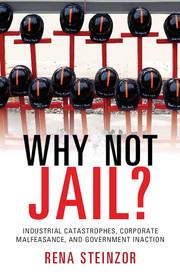Chapter 8 - Deferred Prosecution Agreements
Published online by Cambridge University Press: 05 December 2014
Summary
Whether the [DOJ] needs a middle ground between prosecution and declination [of a case] is far from clear. … The evolution of the Justice Department’s approach to deferred prosecution and non-prosecution agreements, however, is best described as a policy in search of a rationale.
David Uhlmann, former chief, DOJ Environmental Crimes SectionCorporations suffer a peculiar vulnerability. The rules of criminal liability allow federal and state prosecutors to unduly punish those corporations that fall within their crosshairs. But the recent emergency of deferred prosecution agreements (DPAs) to force major changes in corporate governance should give pause to even the most ardent populist.
Richard Epstein, Professor, New York University Law SchoolWhat has intensified under your watch is a pervasive system of double standards: tough criminal penalties and lifetime stigma for individual street criminals, but second (and third chances) for corporate criminals that promise to do better in the future. The double standard is all the worse because it contradicts and undermines the basic purposes of the criminal justice system – deterrence and punishment – for the very actors for whom such objectives make the most sense. Because corporations coldly calculate costs and benefits – undertaking careful and detailed risk assessments as a fundamental part of their intentional decision-making process – they are most likely to be responsive to hard-hitting penalties, not fines easily integrated and transferred into the “cost of doing business.”
Ralph Nader, founder, and Robert Weissman, president, Public Citizen- Type
- Chapter
- Information
- Why Not Jail?Industrial Catastrophes, Corporate Malfeasance, and Government Inaction, pp. 253 - 276Publisher: Cambridge University PressPrint publication year: 2014

